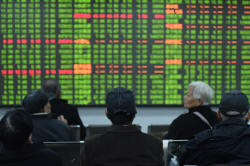Half a trillion dollars wiped from China markets in a week as clampdowns
shatter confidence
 Send a link to a friend
Send a link to a friend
 [August 20, 2021] By
Tom Westbrook and Samuel Shen [August 20, 2021] By
Tom Westbrook and Samuel Shen
(Reuters) -China's tech stocks slumped to
new lows on Friday and Hong Kong's benchmark index hit an almost
10-month trough, as an unrelenting series of Chinese regulatory
crackdowns crushed investors' confidence.
More than $560 billion in market value has been wiped off Hong Kong and
mainland China exchanges in a week as funds capitulate out of once-favoured
stocks, unsure which sectors regulators will target next.
The Hang Seng fell 1.8% and its weekly drop of 5.8% was the largest
since the height of the pandemic panic in financial markets in March
2020.
Stocks in Shanghai also fell, while investors sold risky corporate debt
and the Chinese currency. The yuan was poised for its biggest weekly
loss in two months as investors rushed to safety amid global coronavirus
concerns. [CNY/][.SS]

"There isn't really one trigger, but many bits and pieces that add to
the narrative to stay away from China," said Dave Wang, a portfolio
manager at Nuvest Capital in Singapore.
"Almost on a daily basis you have negative news coming out, so it forms
the impression there's no end in sight."
This week alone China announced tougher rules on competition in the tech
sector, summoned executives at property developer Evergrande to warn
them to reduce the firm's massive debt and state media reported looming
regulations for liquor makers, a favourite tipple for foreign fund
managers.
On the heels of crackdowns spanning from steelmaking to e-commerce and
education, the moves are sapping faith in a market that seems yet to
find a floor after months of selling.
The Shanghai Composite dropped 1.1% to its lowest close in more than two
weeks on Friday and blue chips fell 1.9%, with liquor makers leading
losses.
China Telecom was a rare bright spot and surged on its debut in
Shanghai.
The epicentre of the selloff has been the tech sector, which had been
popular with foreign investors who are now afraid they can't quantify
the regulatory risk and are selling in droves.
Hong Kong's Hang Seng Tech index, comprised of many one-time darlings,
dropped 2.5% on Friday to a new record low and has shed about 48% since
February.
[to top of second column] |

Investors sit in front of a board showing stock information at a
brokerage house on the first day of trade in China since the Lunar
New Year, in Hangzhou, Zhejiang province, China February 3, 2020.
China Daily via REUTERS

E-commerce titan Alibaba's Hong Kong shares fell 2.6% to a record closing low
and have halved from an October peak. Internet giant Tencent touched a 14-month
low and food deliverer Meituan hit a one-year low.
"There's a herd mentality at the moment," said Louis Tse managing director of
Hong Kong brokerage Wealthy Securities. "People see one person selling and then
they do the same."
As a result, Alibaba now commands its lowest price-to-earnings ratio since its
listing in New York in 2014 and Tencent its lowest in more than eight years.
"Tencent and Alibaba wouldn't be trading around 20 times earnings if the general
mood around them was optimism," said Tariq Dennison, managing director at GFM
Asset Management in Hong Kong, who was actually a buyer of both on Friday.
Adding to regulatory worries are concerns that China's economic recovery is
losing momentum and debt risks are rising, as data points to slowing demand and
factory output and suggests authorities are cracking down at a delicate time.
Policymakers' persistence with curbing red-hot property prices, for example, has
markets on edge and corporate credit fell further on Friday with the news that
heavily-indebted Evergrande had been rebuked by regulators.
The yuan has fallen through its 200-day moving average against a broadly rising
U.S. dollar and weakened past the psychological 6.5 per dollar mark, hitting a
three-week low of 6.5059 during onshore trade on Friday.
The Hong Kong dollar sits close to its weakest in a year and a half, also
suggesting money is moving out of the city.
(Reporting by Tom Westbrook in Singapore, Alun John in Hong Kong and Samuel Shen
in Shanghai; Editing by Ana Nicolaci da Costa and Kim Coghill)

[© 2021 Thomson Reuters. All rights
reserved.] Copyright 2021 Reuters. All rights reserved. This material may not be published,
broadcast, rewritten or redistributed.
Thompson Reuters is solely responsible for this content. |